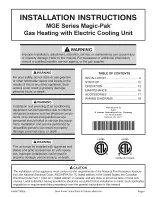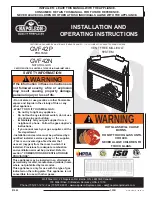
17
GENERAL MAINTENANCE
In certain water conditions, the anode will react with
the water, producing discoloured or smelly water.
The most common complaint is hot water that smells
like rotten eggs. This phenomenon is the result of the
reaction between the anode and hydrogen sulfide
gas dissolved in the water, which occurs frequently
in well systems. This problem can usually be
eliminated or reduced by changing the anode to a
type more suitable for these conditions (aluminum
anode) and by chlorinating the water heater and
plumbing system. If the problem persists, special
filtration equipment may be required. Under no
circumstances is the anode to be removed from the
water heater on a permanent basis.
Removal of the
anode will lead to premature failure of the water
heater and void the warranty
.
Hydrogen gas can be produced in a hot water
system that has not been used for a long period
of time (generally two [2] weeks or more).
H Y D R O G E N G A S I S E X T R E M E LY
F L A M M A B L E
. It is highly recommended
to open the hot water faucet in the kitchen for
several minutes before you use any electrical
appliances connected to the hot water system,
such as a dishwasher or washing machine. If
hydrogen gas is present, there will be an unusual
sound, such as air escaping through the pipe, as
the hot water faucet is opened.
DO NOT
smoke
or introduce an open flame near the faucet when it
is opened.
Draining the Water Heater
To completely drain the water heater:
1) Turn the temperature dial clockwise to the
“
Pilot Lighting
” position.
2) Rotate and partially depress the gas control knob
clockwise to the “
OFF
” position.
3) Shut off the gas supply to the water heater by
closing the manual shut-off valve.
4) Close the cold water supply to the water heater by
closing the cold water supply valve.
5) Connect one end of a garden hose to the water
heater drain valve and put the other next to a free
flowing drain.
6) Open the drain valve by inserting a flat head
screwdriver into the slot on the head of the drain
valve and turning the knob counterclockwise .
7) Open a hot water faucet to allow air into the system.
Vacation
If you are planning a vacation or other prolonged
absence, it is highly recommended to shut off the
gas supply and the cold water supply to the water
heater. This will save energy, protect against property
damage in the event the water heater leaks, and
prevent the build-up of hydrogen gas. If the water
heater and piping are exposed to freezing tempera-
tures, they should both be drained.
Remember to check the water heater thoroughly
after it has been shut off for an extended period of
time before putting it back in operation. Make sure
that the water heater is completely full of water, and
that the cold water supply manual shut-off valve is
open, before lighting the burner.
Getting Service for your Water Heater
If you are having problems with your water heater,
follow these three easy steps:
1) Consult the Troubleshooting Guide contained in this
manual (
see Page 18
). It lists the most common
problems experienced with your gas-fired water
heater. The solutions you find listed may provide a
quick and simple solution to your problem and save
you time and money.
2) If the solution listed in the Troubleshooting Guide
does not solve the problem or if your particular
problem is not listed in the guide, contact the
installer of the water heater, or the local gas utility.
3) If you still cannot solve the problem, contact the
manufacturer’s Customer Service Department by
e-mail at
or by telephone
at
1-800-363-9354
. To help serve you in a quick
and efficient manner,
always have the following
information ready:
a) Model number.
b) Serial number.
c) Date of installation.
d) Where the water heater was purchased.
e) Complete address where the water heater
is installed.
f) A description of the problem.
WARNING
A






































